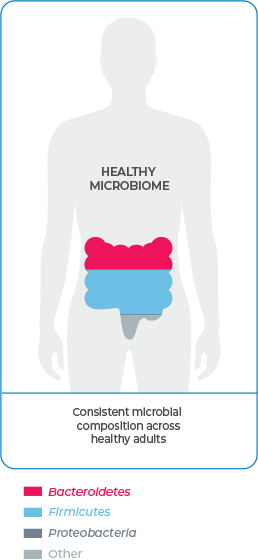
Get the full story of the microbiome
- Importance of Microbial Diversity
- Dysbiosis and Recurrent C. difficile Infection
- Historic Microbiome Restoration Approaches
- Patient and Healthcare Burdens
A diverse microbial composition is essential to overall health
The gut microbiome—the microbial community in the intestinal tract—is an influencer of metabolism and immunity and a mediator of resistance to some pathogenic infections.1,2

A distinct and essential organ within the body, the gut microbiome contains an estimated 500-1000 species and 100 trillion organisms, encoding 100-fold more unique genes than our own genome.1-4
The microbiome influences metabolism and immunity and acts as a mediator of resistance to some pathogenic infections.1
In its balanced state, there is a symbiotic relationship between luminal bacteria and our human cells.5
These cells communicate and form long-lasting, interactive associations that play a vital role in the conservation of mucosal immune function, epithelial barrier integrity, motility, and nutrient absorption.2,5,6
Bacteroidetes and Firmicutes are the most prevalent phyla in the gut microbiome and—working symbiotically—are vital to maintaining overall health and inhibiting C. difficile infection (CDI).1-3,7-9

Bacteroidetes (Gram-negative)
Their ability to adapt and persist in changing gut environments allows abundance and stability, providing long-term associations with human hosts and enabling functions that include7,10-12:
- Immunomodulatory effects7
- Inhibitory activities against C. difficile13
- Reduction of C. difficile colonization13
- Essential contributor to the stability of the microbiome7
Firmicutes (Gram-positive)
Composed of helpful and harmful bacteria, Firmicutes are the most abundant and diverse bacterial gut species with functions that include3,14:
- Anti-inflammatory effects15-17
- Fortification of gut barrier (along with other bacteria) observed preclinically18-20
- Most abundant phyla in the gut microbiome3
Proteobacteria
- A biomarker for inflammatory disease as well as C. difficile infection and colonization. CDI is associated with its increase21-24
Deficiencies in Bacteroidetes and Firmicutes are specifically associated with dysbiosis.3,5
